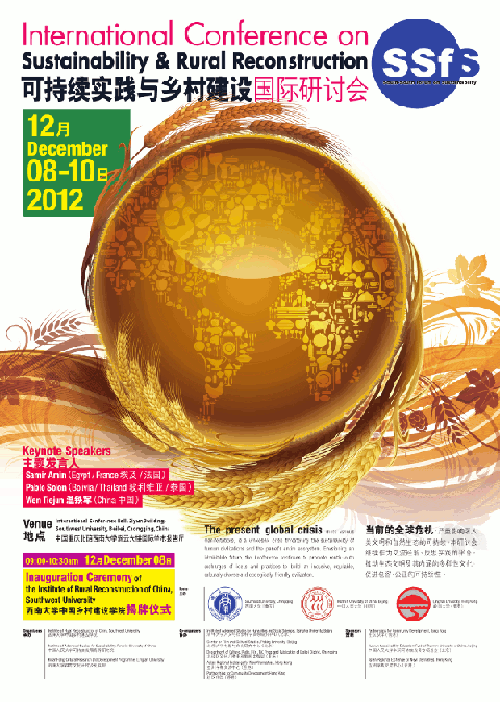Event Title
2012 International Conference on Sustainability & Rural Reconstruction
Start Date
9-12-2012 11:45 AM
End Date
9-12-2012 1:00 PM
Language
English
Description
This presentation examines intellectual property rights (IPR) regimes as they apply to agricultural germplasm in the context of global North-South relations. The issue is pertinent particularly since TRIPs (Trade-related Aspects of Intellectual Property Rights) became enshrined in the statutes of the World Trade Organization in 1994, institutionalizing the notion of "germplasm as property" throughout the globe. Yet, the idea of "germplasm as property" is historically a notion culturally specific to the global North. It is perhaps no surprise that many germplasm patents are being held on biological matter that originated in the South – in the Vavilovian "centers of diversity". This paradox situates the contest over biodiversity resources in a world-historic context and undermines the declared reasons for germplasm IPRs. Being more than just a North-South conflict over resources, however, this episode features also a confrontation between competing worldviews of nature-human relations: as the global South asserts its sovereignty and lays claim to "its" natural resources as "national property", one finds the "communal" invariably giving way to the "proprietary" in natural resource management. Such is the dilemma surrounding sovereignty: as nations of the South claim ownership of "nature", systems of enclosing the common/s are inadvertently being instituionalised, entrenching them only deeper within a capitalist mode of life.
本文讨论“知识产权”(IRP) 应用到南、北国家的农业种质的关系问题。1994年《与贸易有关的知识产权协议》(TRIPs) 在世贸(WTO) 成为法规,并在全球形成“种质财产”(germplasm as property) 的观念。然而,历史上此观念是北方国家专有的。被北方国家霸占了专利的种质大多数来源于南方国家;正如前苏联生物学家Vavilov所指出的,后者才是“生物多样性的中心”。这矛盾将关于生物资源的争论置于一个国际历史背景中,并且导致种质专利的产生原因被模糊。这不只是一个南北资源争夺战,也是一场人与自然关系的不同世界观的对峙。当南方国家确立国家主权并将自然资源视为“国家财产”的时候,“公共所有”这个概念就被对自然资源进行“财产管理”所取代。这就是关于主权的两难:当南方国家对自然声称所有时,就深陷资本主义的陷阱中了。
Document Type
Conference
Recommended Citation
Kho, T. Y. (2012, December). Gerplasm property regimes and the dilemma of sovereignty. Paper presented at 2012 International Conference on Sustainability & Rural Reconstruction, Southwest University, Chongqingng, China.
Included in
Demography, Population, and Ecology Commons, Growth and Development Commons, Other International and Area Studies Commons, Place and Environment Commons, Sociology of Culture Commons
Gerplasm property regimes and the dilemma of sovereignty = 种质产权和维护主权的两难
This presentation examines intellectual property rights (IPR) regimes as they apply to agricultural germplasm in the context of global North-South relations. The issue is pertinent particularly since TRIPs (Trade-related Aspects of Intellectual Property Rights) became enshrined in the statutes of the World Trade Organization in 1994, institutionalizing the notion of "germplasm as property" throughout the globe. Yet, the idea of "germplasm as property" is historically a notion culturally specific to the global North. It is perhaps no surprise that many germplasm patents are being held on biological matter that originated in the South – in the Vavilovian "centers of diversity". This paradox situates the contest over biodiversity resources in a world-historic context and undermines the declared reasons for germplasm IPRs. Being more than just a North-South conflict over resources, however, this episode features also a confrontation between competing worldviews of nature-human relations: as the global South asserts its sovereignty and lays claim to "its" natural resources as "national property", one finds the "communal" invariably giving way to the "proprietary" in natural resource management. Such is the dilemma surrounding sovereignty: as nations of the South claim ownership of "nature", systems of enclosing the common/s are inadvertently being instituionalised, entrenching them only deeper within a capitalist mode of life.
本文讨论“知识产权”(IRP) 应用到南、北国家的农业种质的关系问题。1994年《与贸易有关的知识产权协议》(TRIPs) 在世贸(WTO) 成为法规,并在全球形成“种质财产”(germplasm as property) 的观念。然而,历史上此观念是北方国家专有的。被北方国家霸占了专利的种质大多数来源于南方国家;正如前苏联生物学家Vavilov所指出的,后者才是“生物多样性的中心”。这矛盾将关于生物资源的争论置于一个国际历史背景中,并且导致种质专利的产生原因被模糊。这不只是一个南北资源争夺战,也是一场人与自然关系的不同世界观的对峙。当南方国家确立国家主权并将自然资源视为“国家财产”的时候,“公共所有”这个概念就被对自然资源进行“财产管理”所取代。这就是关于主权的两难:当南方国家对自然声称所有时,就深陷资本主义的陷阱中了。
